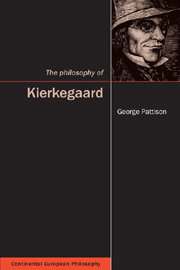Book contents
- Frontmatter
- Contents
- Dedication
- Acknowledgements
- Abbreviations and forms of reference
- Dedication
- Introduction: Kierkegaard and philosophy
- 1 Existence
- 2 Anxiety
- 3 The good
- 4 The infinite qualitative difference and the absolute paradox
- Epilogue: The Christian witness and the simple wise man of ancient times
- Notes
- Guide to further reading
- Index
3 - The good
- Frontmatter
- Contents
- Dedication
- Acknowledgements
- Abbreviations and forms of reference
- Dedication
- Introduction: Kierkegaard and philosophy
- 1 Existence
- 2 Anxiety
- 3 The good
- 4 The infinite qualitative difference and the absolute paradox
- Epilogue: The Christian witness and the simple wise man of ancient times
- Notes
- Guide to further reading
- Index
Summary
Choosing the self (Either/Or 2)
We have now had the opportunity to consider what Kierkegaard called the aesthetic life from several angles. In Chapter 1 the Romantic ironist appeared as an individual version of the Fichtean absolute “I”, inventing himself in what Kierkegaard judged to be an arbitrary and capricious manner. Unfortunately for the ironist, this meant that he deprived himself of a genuinely vivifying contact with reality and is likely to end up, like the Seducer of Either/Or 1, living at one remove from real life, behind the gauze. Despite the ironist's self-image being capability of playing infinite variations upon any given mood or situation, Kierkegaard's analysis portrayed him as inevitably succumbing to the ebb and flow of moods that are, ultimately, beyond his control. In Chapter 2 this characterization was extended by the depiction of the aesthetic life as a kind of atrophy of the self, a perpetuation of the state of childhood that bore the hallmark of chronic anxiety. For all the glitz and glamour of his self-presentation, the aesthete is, finally, someone who lacks the courage for responsible adult life. It is a life that remains under the spell of its own endless possibilities, but that never really succeeds in actualizing any of them. And there are hints of something darker; the violence of the aesthete's invocation of an annihilating vortex and the cruelty of a Nero suggest that this is more than a matter of whimsical poets and ageing hippies incapable of connecting with the demands of practical affairs.
- Type
- Chapter
- Information
- The Philosophy of Kierkegaard , pp. 90 - 132Publisher: Acumen PublishingPrint publication year: 2005



